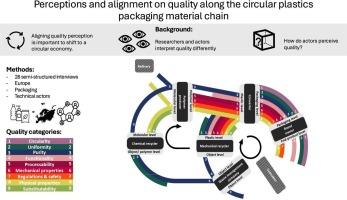对循环塑料包装材料链质量的认识和调整
IF 7.1
2区 环境科学与生态学
Q1 ENGINEERING, ENVIRONMENTAL
引用次数: 0
摘要
在塑料回收利用领域,质量越来越重要,但却没有明确的定义,因为人们对质量的实际含义有着广泛的认识。这项探索性研究有助于深入了解塑料包装材料加工链中不同参与者对质量的看法。通过进行半结构化访谈,我们收集了聚合物生产商、加工商、品牌所有者、废物管理公司、机械回收商、化学回收商、添加剂生产商和设备制造商对质量认知的数据。结果表明,根据参与者在产业链中所处的位置,他们对质量概念的认识也不尽相同。我们将他们使用的质量标准分为九个质量类别:纯度、均匀性、机械性能、物理性能、可加工性、功能性、法规和amp;安全性、可替代性和循环性。访谈显示,产业链中的参与者对质量的认识存在具体差异,这可能会使回收系统的效率复杂化。尽管存在这些差异,但许多质量观念确实与价值链中前行为者和后行为者的质量观念相吻合,但并不一定得到认可。本文章由计算机程序翻译,如有差异,请以英文原文为准。

Perceptions and alignment on quality along the circular plastics packaging material chain
In plastics recycling, quality is increasingly important but not unequivocally determined, as there is a wide range of perceptions on what it actually means. This exploratory research offers insights into how different actors perceive quality in the plastics packaging material processing chain. By conducting semi-structured interviews, we gathered data on quality perceptions from polymer producers, converters, brand owners, waste management companies, mechanical recyclers, chemical recyclers, additive producers, and equipment manufacturers. The results show that, depending on the position of the actors in the chain, their perceptions of the concept quality differ. We categorized the quality criteria they use into nine quality categories: purity, uniformity, mechanical properties, physical properties, processability, functionality, regulations & safety, substitutability and circularity. The interviews revealed specific differences in quality perceptions between the actors in the chain, which can complicate the efficiency of the recycling system. Despite these differences, many quality perceptions do match those of the previous and subsequent actors in the value chain but are not necessarily acknowledged as such.
求助全文
通过发布文献求助,成功后即可免费获取论文全文。
去求助
来源期刊

Waste management
环境科学-工程:环境
CiteScore
15.60
自引率
6.20%
发文量
492
审稿时长
39 days
期刊介绍:
Waste Management is devoted to the presentation and discussion of information on solid wastes,it covers the entire lifecycle of solid. wastes.
Scope:
Addresses solid wastes in both industrialized and economically developing countries
Covers various types of solid wastes, including:
Municipal (e.g., residential, institutional, commercial, light industrial)
Agricultural
Special (e.g., C and D, healthcare, household hazardous wastes, sewage sludge)
 求助内容:
求助内容: 应助结果提醒方式:
应助结果提醒方式:


